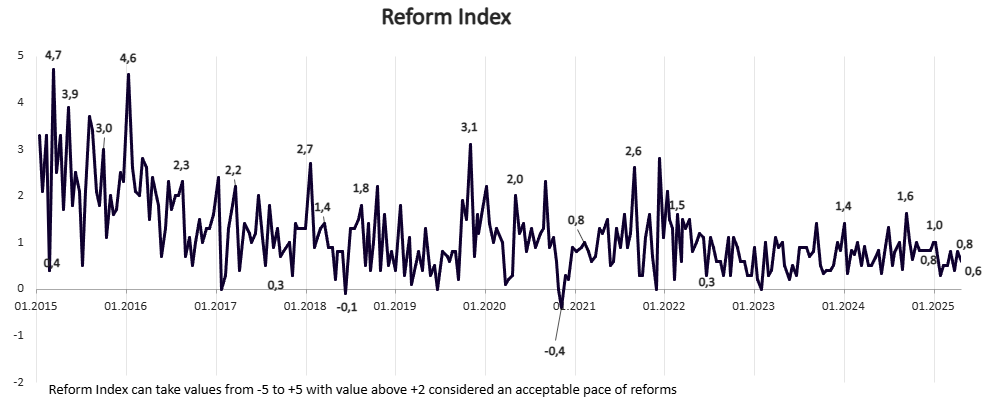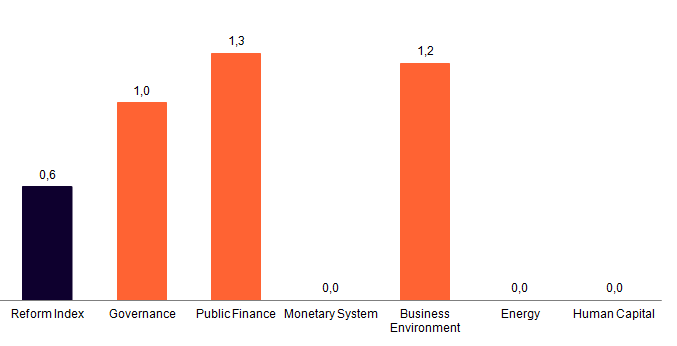In Issue 262 of the Reform Index, experts recorded another counter-reform: a law prohibiting the state from reclaiming property from an owner if it was acquired more than 10 years ago. Experts rated this decision at -1 point, marking it as the second counter-reform measure since the beginning of 2025.
At the same time, experts gave positive assessments to the government’s efforts aimed at business deregulation (+2 points) and to the law on the automotive services market, which brings Ukrainian legislation closer to EU standards (+1 point). Overall, between April 7 and April 20, six reforms were noted. The Index score for the period stands at 0.6 points, compared to 0.8 points in the previous issue.
Graph 1. Dynamics of the Reform Index

Graph 2. Values of the Reform Index and its Components in the Current Assessment Round

Law on protecting the rights of bona fide purchasers, -1 point
The new law establishes that if more than 10 years have passed since the privatization of real estate or land, the state or a local community can no longer reclaim it—even if the transfer was illegal. This applies to forests, riverbanks, lake shores, and other natural areas.
The only exceptions to this rule are critical infrastructure facilities, strategic assets (such as defense enterprises and energy sites), defense lands, nature reserves, hydraulic structures (dams, canals, etc.), and cultural heritage properties that were not subject to privatization.
At the same time, the law grants the state or communities the right to file a lawsuit to reclaim property before the 10-year period expires. This requires the claimant to deposit the property’s market value with the court. In other words, the state must be able to pay fair market compensation for the property if it wins the case.
Information about the Reforms Index project, the list of Index experts and the database of the regulations assessed are available here.
Expert commentary
Andrii Shvadchak, Legal Advisor at Transparency International Ukraine
“Transparency International Ukraine views Law No. 4292-IX negatively. First, it restricts the ability of the state and local communities to reclaim property that was unlawfully removed from their ownership once more than 10 years have passed since its sale to a bona fide purchaser.
In addition, the law changes the starting point for the statute of limitations in property reclamation disputes. Previously, the statute of limitations (the period during which a lawsuit could be filed) began when the state became or should have become aware that the property had been unlawfully transferred. Now, the statute of limitations begins on the date the property was transferred to a bona fide purchaser or the date of official registration of ownership. In practice, this reduces the window for the state or communities to reclaim property from 10 years to 3 years.
Under the general rule (as set by the Civil Code), the statute of limitations begins on the day a person learned or could have learned of a violation of their rights. The new law changes this approach by starting the limitation period from the date of transfer to the bona fide purchaser or the date of state registration of ownership.
For example, if a property was registered to a bona fide purchaser in January 2020, and the community discovered the illegal transfer only in February 2023, the statute of limitations for reclaiming the property would have already expired. Although the community could technically still file a lawsuit (the law allows filing until January 2030), a simple statement by the defendant (the bona fide purchaser) asserting that the statute of limitations has expired would be enough for the court to dismiss the case without substantive review. Thus, in practice, the state or the community would not have 10 years but only three—the limitation period—to have a real chance of reclaiming the property through the courts.
Furthermore, if the state or community succeeds in reclaiming the property, it would be required to compensate the new owner for its value and, in the case of filing a lawsuit, to deposit the funds into an escrow account with the court. Only afterward would it be able to pursue recovery from the liable party. This creates an additional financial burden, which could be particularly heavy on local budgets.
Finally, the law’s provisions limiting the time frame for property reclamation are retroactive, which contradicts the principle of non-retroactivity guaranteed by the Constitution.”
Business deregulation in healthcare, sanitary control, agriculture, and the space industry, +1.25 points
In April 2025, the government decided to repeal more than 200 outdated regulatory documents. The reform targeted a large number of obsolete permits, approvals, and consents across sectors such as healthcare, agriculture, environmental protection, occupational safety, trade, fire safety, transportation, the space industry, and others.
As part of the reform, permits were abolished for activities such as selling products outside of designated establishments (primarily affecting mobile and outdoor food sales), reopening hair salons after renovations, constructing wellness facilities and admitting guests to them, changing a company’s business profile, and using stove heating in rural recreational halls. Some questionable permits, such as certificates attesting to a person’s healing abilities, were also eliminated.
The most significant changes affected the healthcare sector and sanitary control, where 150 regulations were repealed.
Expert commentary
Hanna Bashniak, Regulatory Policy Sector Head at BRDO
“The repeal of more than 200 outdated regulatory instruments is a decisive move by the government, which, according to our estimates, will save businesses over UAH 600 million annually—funds entrepreneurs can now invest in development instead of spending on bureaucracy.
These decisions are the result of the work of the government’s Interdepartmental Working Group on Deregulation, which includes representatives from the ministries of economy, digital transformation, environment, justice, finance, and the State Regulatory Service. Ukrainian think tanks, including BRDO experts, also participated in the group’s work. The working group systematically analyzes existing regulations and provides recommendations on whether to repeal, amend, or retain them. The goal is to reduce administrative pressure, particularly in healthcare, agriculture, construction, culture, education, science, energy, and other sectors. To date, the group has reviewed 1,323 regulatory instruments, recommending the repeal of a third (456), with more than 300 already repealed.
The government has also supported a draft law to repeal an additional 63 regulatory instruments, with an estimated economic benefit of UAH 400 million—we now await Parliament’s approval.
We view these government steps positively, as they create a more transparent business environment and stimulate the development of entrepreneurship.”
Law on the automotive services market, +1 point
Law No. 4337-ІХ establishes uniform standards for carriers engaged in international freight transport, passenger transport, and the transport of dangerous goods. In particular, it introduces a list of criteria carriers must meet to obtain a license.
To qualify, a carrier must confirm an impeccable business reputation and the absence of serious legal violations, including those related to transport safety, road traffic, tax, and labor laws. Companies must also demonstrate financial reliability, which can be confirmed through financial statements, a bank guarantee, or a liability insurance contract covering passengers. Finally, the transport manager must possess the necessary logistics qualifications, verified by a certificate. The certificate will be valid for 10 years and issued based on the results of an examination, with the exam procedure to be developed by the Cabinet of Ministers.
Furthermore, the law provides for the launch of the Unified Complex of Road Transport Safety Information Systems (UCIS). This system will automatically collect information about carriers (including license status, records of violations, and court decisions), vehicles, and transport managers.
Expert commentary
Iryna Kosse, Leading Research Fellow at the Institute for Economic Research and Policy Consulting (IER)
“This is an important law that partially implements Regulation (EC) No. 1071/2009, as required by the Association Agreement (Article 367). The regulation sets uniform rules for access to the transport market for all companies in the EU. Since we aim to become part of this system, we must play by the same rules.
However, there are some nuances. In particular, the conclusion of the Verkhovna Rada Committee on European Integration clearly states that ‘the law does not fully comply with the EU regulation, specifically regarding the definition of “good repute.”‘
In the EU, the loss of good repute is determined by a flexible system that considers the frequency, severity, and overall context of violations. The European Union uses a points-based system to assess reputation, and licensing decisions are based on risk analysis. In contrast, the Ukrainian law establishes a purely formal list of grounds that automatically result in the loss of reputation.
To address this shortcoming, it would be advisable to introduce a classification system for violations—categorizing them as serious, moderate, or minor; providing for the accumulation of points or risk indicators; and granting licensing authorities discretionary powers to assess the carrier’s overall conduct rather than relying solely on formal criteria.”
Reform Index from VoxUkraine aims to provide a comprehensive assessment of reform efforts by Ukraine’s authorities. The Index is based on expert assessments of changes in the regulatory environment in six areas: Governance, Public Finance, Monetary system, Business Environment, Energy, Human Capital. Information about the Reforms Index project, the list of Index experts and the database of the regulations assessed are available here.
Attention
The author doesn`t work for, consult to, own shares in or receive funding from any company or organization that would benefit from this article, and have no relevant affiliations



